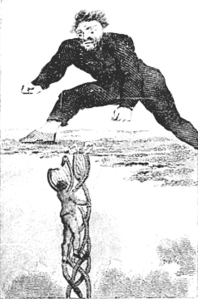Hello everyone. Are we ready for this mid-week installment of Bill’s Bologna? Yes? Awesome! No? Too bad because here we go.
Today, we’re going to focus on the phrase “spilling the beans.” It’s widely used throughout the English speaking world, & it what we say when someone accidentally lets a secret slip out.
The most popular explanation on the internet has to do with Ancient Greece & their voting methods. In Athens, they voted by placing white & black beans in jars. A tally of the beans would be taken. It’s commonly believed that this is the origin of the phrase because if you spilled the jar of beans, you’d ruin the vote.
In her WiseGeek article, “What Does ‘Spill the Beans’ Mean?”, Mary McMahon mentions that another common way to explain the phrase goes back to the Middle Ages. Beans were a relatively cheap crop to grow & sell. They could bring in a lot of money, but you had to plant them the right way. If you spilled them, they’d grow incorrectly.

Unfortunately, Jack didn’t spill the beans when he planted them. Now that big dude wants to eat him.
Okay, at the risk of sounding like a toothpaste commercial, I’m going to go ahead & say that nine out of ten etymologists will probably tell you that both the Greek origin & this one are not likely.
Here’s why:
First, let’s take a look at the word “spill.” Over its eight hundred year life, it has evolved quite a bit.The word dates back to the Twelfth Century & back then, it didn’t mean accidentally emptying a container. The word spill comes from the Old English (Not Ancient Greek) word, “spillan,” which simply means to kill. Later, in Middle English, the spelling changed to “spillen.” Around that time, it also became synonymous with slaughtering & causing destruction. This is where the phrase “spilling blood” originates. At the same time, I’d be willing to bet that at some point before it meant what we know it to mean today, “spilling your guts” meant to open up. Well, it does but in a very gaping stomach wound-type way, instead of emotionally. Anyway, over the ages, “spill” continued to soften its definition until it meant causing the kind of damage not necessarily associated with death, & eventually it turned into accidentally emptying the contents of something.
So, let’s get back to the Greeks. This notion wouldn’t be possible because the word “spill” didn’t even exist in Greek & even if it had, it would not have been used to describe what happens to the beans when their container is knocked to the ground. The translation would be, “kill the beans.”
As for the Middle Age’s bean planting problems, this hypothesis doesn’t really work either. By dropping a few beans, you most definitely wouldn’t be causing any grave damage or ruining anything. You’d most likely have enough to plant a good crop if you did spill a few. Even if you didn’t have enough, you could just pick up the ones you dropped & replant them.
Moving on. Why beans & not candy… or money?
Well, an English website called The Phrase Finder suggests a very simple idea. Beans might just be a filler word that originated in the United States. Around the turn of the century, there were many similar phrases using the familiar “spill the _______.” Ones like “spill the soup” have gone by the wayside, leaving the ones we know.
The first recorded usage of the phrase using the word “beans” is from 1908, being used in politics & sports to describe unexpected upsets. Though it was the first written record, the phrase in this form was probably around in some capacity before then. Remember, many things get written down well after they’re spoken for the first time.
Most scholars agree that the expression evolved to what it is today in the late 1920s & 1930s, but this is where the internet trail goes cold. We get no real explanation as to why. Wikipedia takes a stab by claiming that it became popular among hoboes, or the homeless population caused by the Great Depression, but in true Wikipedia fashion, it offers no explanation or backup for this. Don’t take it seriously. Unfortunately, most of the web pages that mention the homeless of the Depression use the Wikipedia entry as their source. Come on, internet writers. You know better.
If anyone has any more information on this other than, “It happened because of hoboes,” please feel free to leave a comment. I’d like to know.I most certainly am not an expert, but to sum this up, this one seems pretty inconclusive. We know the Ancient Greeks most likely didn’t coin the phrase because the word “spill” isn’t remotely Greek & we know that it wasn’t coined in the Middle Ages, because back then, “spill” meant something totally different. We also know the phrase as we know it, using the word “beans” as the object being dumped, didn’t appear on paper until the early 1900s. It probably was used verbally before then, but it certainly wasn’t being used in Ancient Greece.
At any rate, the conclusion I’ve reached is that the true origin of this one is lost to time. As the definition of the words involved evolved, it opened them up to different uses in slang & idioms. I guess that’s the way it goes.
For now, though, now you know; you’re welcome.

![Tramp_smoking_cigar_with_cane_over_arm[1]](https://billsbologna.files.wordpress.com/2013/11/tramp_smoking_cigar_with_cane_over_arm1.jpg?w=230&h=300)
![Old_oak_tree_in_Florham_Park_NJ[1]](https://billsbologna.files.wordpress.com/2013/11/old_oak_tree_in_florham_park_nj1.jpg?w=300&h=199)
![St._Yves[1]](https://billsbologna.files.wordpress.com/2013/11/st-_yves1.jpg?w=300&h=252)

![Nerves_of_the_left_upper_extremity[1]](https://billsbologna.files.wordpress.com/2013/11/nerves_of_the_left_upper_extremity1.gif?w=157&h=300)
![Gray1236[1]](https://billsbologna.files.wordpress.com/2013/11/gray12361.png?w=300&h=105)